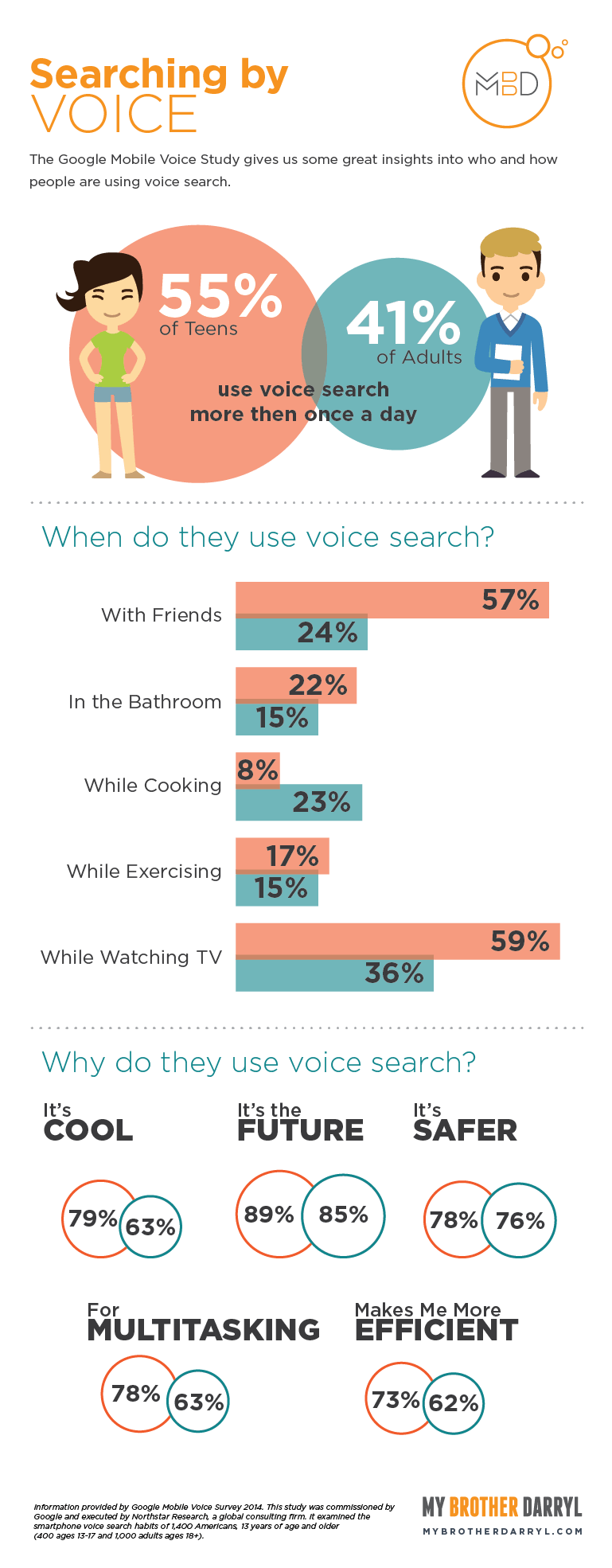Adapting Your Marketing Strategy for Voice Search

Voice Search uses the power of speech recognition to search the web! Instead of typing, users dictate their search term or comment on social media with ease — using just their voice.
Voice search is beginning to find wide-spread acceptance and in doing so signifies a dramatic change in the way consumers undertake their online searches. The way we communicate with our devices is changing drastically. Now, approximately 55% of teens and 41% of adults use voice search at least once a day and marketers need to be ready.

Searching by Voice
The Google Mobile Voice Study gives us some great insights into who and how people are using voice search.
55% of Teens and 41% of Adults use voice search more then once per day.
When do they use voice search?
Teens:
With Friends: 57%
In the Bathroom: 22%
While Cooking: 8%
While Exercising: 17%
While Watching TV: 59%
Adults:
With Friends: 24%
In the Bathroom: 15%
While Cooking: 23%
While Exercising: 15%
While Watching TV: 36%
Why do they use voice search?
Teens:
It’s Cool: 79%
It’s the Future: 89%
It’s Safer: 78%
For Multitasking: 78%
Makes Me More Efficient: 73%
Adults:
It’s Cool: 63%
It’s the Future: 85%
It’s Safer: 76%
For Multitasking: 63%
Makes Me More Efficient: 62%
Source: Google Mobile Voice Survey 2014
How Voice Search Will Affect Digital Marketing and SEO
The growing adoption of voice search will undoubtedly have a huge impact on the way in which user conduct our marketing and SEO efforts. Case in point. Just the words used in voice searches are already changing marketing content.
When users conduct a voice search, instead of focusing on a small group of words, they engage in a dialogue or conversation the same way they might have with a friend. Accordingly, search engines are becoming more specific when looking for answers to consumers’ questions. As a result of this change in search behavior, Marketers will have to create two strategies for content marketing and SEO: one for customers making text-based searches, and one for those making voice-activated ones. Whether it is keyword search or voice search, SEO now needs to take a more conversational approach, and that means companies will need to create new content to reach their audiences.
Opportunities
Mobile voice searches are three times more likely to be local-based than text ones; so, if you’ve got a physical storefront and the right voice search strategy, the likelihood is business will be booming.
Considering that nearly 50% of people use voice search to research products, and executives are spending more time on mobile researching business purchases, businesses should be primed to capitalize on voice search.
In addition, search engines are now ranking businesses according to reviews as well. Simply put, if you’ve got satisfied customers leaving positive reviews, you’re more likely to come up at the top of Google’s recommendations.
Creating a new content strategy while time consuming, may be easier than you think—because voice searches are being made in a more conversational tone, and so keyword research becomes a little more straightforward.
Barriers
Even if potentially more straightforward than text-search-based keyword strategies, voice-search keyword research means Marketers will need to learn the exact terms being used by your audience—so that they can reach them through their content.
Current technological limitations, combined with voice search technology is still evolving, and low usage compared with text-based searches, means there is barely enough data to truly optimize for voice search at the moment.
Despite such obstacles, voice search is not only here to stay but also growing rapidly. To be able to compete with other businesses in the coming years, you’ll need to start planning your new strategy as soon as possible.
Future of Voice Search

Predictions for the next three years are all looking at voice search as the next big thing: 50% of all searches are expected to be voice-activated by 2020.
It’s also worth noting that it’s not just smartphones being used for voice search. The likes of Amazon’s Echo and Google’s Google Home have now hit the shelves, and experts predict there will be approximately 21.4 billion smart speakers in the US alone by 2020.
Although search engines have been seen to prioritize B2C voice-search queries, there seems to be some movement toward the B2B market; Google recently launched Google for Jobs, an employment search engine that taps directly into the B2B space.
Adapt Your B2B Business for Voice Search
Preparing for the impact of voice search on B2B SEO is not so different from preparing a B2C SEO strategy. The first focus must be on mobile optimization. Executives making voice searches for B2B products or services will be put off by platforms that are not mobile-friendly, and that includes loading speed and user experience.
Also, if you haven’t already, you need to start optimizing all your content for long tail keywords and natural-language queries. Using conversational language in headings, sub-headings, and titles will allow you to become more discoverable during voice searches.
You should also create new content that directly answers your target audience’s most common questions. Long blog posts and informational pieces are great ways to target voice-activated, conversational queries.
Finally, Google is now selecting featured snippets to provide answers to voice queries. The search engine reads the snippet and also highlights the related company’s name, thus increasing brand awareness, so with the right keyword research, you could become Google’s only search result.
The Future of Voice Search with Artificial Intelligence (AI) Marketing
Voice search is still in its infancy. The hype around it is not likely to dissipate anytime soon, and we still have a lot to learn to be able to capitalize on it, especially in the B2B world.
But with the advancements in the technology that powers voice search already well underway, it will only be a matter of time before voice search becomes our primary way of communicating with our mobile devices.
Now is the time to begin to prepare if you want to be at the top of Google’s search rankings in the near future. Staying ahead of the competition will mean keeping up with technological advancements as well as the SEO best-practices that will accompany them.
Also published on Medium